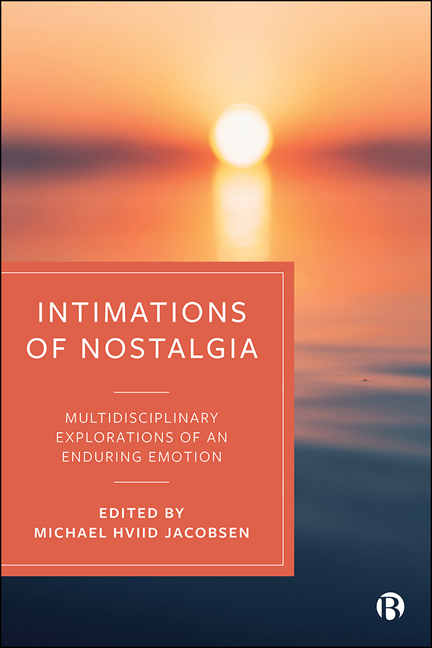Book contents
- Frontmatter
- Contents
- Notes on Contributors
- Preface and Acknowledgements
- Introduction: The Many Different Faces of Nostalgia – Exploring a Multifaceted and Multidisciplinary Emotion
- 1 Philosophy and Nostalgia: ‘Rooting’ within the Nostalgic Condition
- 2 History and Nostalgia: Historicizing a Multifaceted Emotion
- 3 Political Theory and Nostalgia: The Power of the Past in the History of Political Thought
- 4 Sociology and Nostalgia: Micro-, Meso-and Macro-level Dimensions of an Ambiguous Emotion
- 5 Psychology and Nostalgia: Towards a Functional Approach
- 6 Anthropology and Nostalgia: Between Hegemonic and Emancipatory Projections of the Past
- 7 Media Studies and Nostalgia: Media Philosophy and Nostalgizing in Times of Crisis
- 8 Marketing and Nostalgia: Unpacking the Past and Future of Marketing and Consumer Research on Nostalgia
- 9 Literature and Nostalgia: Vestiges of Paradise
- 10 Architecture and Nostalgia: The End of History, the End of the Future and the Prospect of Nostalgia
- Postscript: On Nostalgia of the Future and the Future of Nostalgia – Some Scattered Concluding Observations
- Index
Introduction: The Many Different Faces of Nostalgia – Exploring a Multifaceted and Multidisciplinary Emotion
Published online by Cambridge University Press: 13 May 2022
- Frontmatter
- Contents
- Notes on Contributors
- Preface and Acknowledgements
- Introduction: The Many Different Faces of Nostalgia – Exploring a Multifaceted and Multidisciplinary Emotion
- 1 Philosophy and Nostalgia: ‘Rooting’ within the Nostalgic Condition
- 2 History and Nostalgia: Historicizing a Multifaceted Emotion
- 3 Political Theory and Nostalgia: The Power of the Past in the History of Political Thought
- 4 Sociology and Nostalgia: Micro-, Meso-and Macro-level Dimensions of an Ambiguous Emotion
- 5 Psychology and Nostalgia: Towards a Functional Approach
- 6 Anthropology and Nostalgia: Between Hegemonic and Emancipatory Projections of the Past
- 7 Media Studies and Nostalgia: Media Philosophy and Nostalgizing in Times of Crisis
- 8 Marketing and Nostalgia: Unpacking the Past and Future of Marketing and Consumer Research on Nostalgia
- 9 Literature and Nostalgia: Vestiges of Paradise
- 10 Architecture and Nostalgia: The End of History, the End of the Future and the Prospect of Nostalgia
- Postscript: On Nostalgia of the Future and the Future of Nostalgia – Some Scattered Concluding Observations
- Index
Summary
Introduction
The past is not dead – it is very much a living thing. We may try our best to kill off the past, deny its importance, remove it as far away from our recollections as possible or make it irrelevant to our present concerns, but it is still there, lurking beneath the surface of time and memory. Everything that once was does not disappear but has a spectral presence in the way we live now. Even though the past may be forgotten, and attempts to deny or eradicate the past from the present (individual and collective) are indeed manifold, it can never be unmade. Throughout history, humans have always attempted not only to anticipate and shape the future, but also to make sense of and relate to the/their past. The past is often regarded as the already known territory, whereas the future is regarded as an alien and sometimes even scary terrain. Time, however, is a tricky thing. What we may think we already know well and have left behind us long ago sometimes returns to haunt and pester us – even many years after its actual occurrence. At other times, the re-acquaintance with or revisits to the past – voluntary and involuntary – are much more pleasurable and positive. It is part of our human-being-in-the-world that we seek to create a sense of meaning, direction and purpose with the time that has passed – the time of our own individual lives as well as of broader historical time. ‘Nostalgia’ is a name given to the way (or rather the ways, plural) we somehow seek to connect with the past.
But why is the past so important to most of us – as individuals, groups and societies? Why do we entertain memories, why do we reminiscence, why do we feel nostalgic? There may be many different answers to this question. Perhaps the most obvious answer is that nostalgia arises because we necessarily live our lives from what was once in the past into what is now the present and towards what at the moment constitutes the future – and this future, near and distant, is to many unfathomable as well as uncertain. We know what has been, but we know not what will come. Life does not stand still – it constantly moves in only one direction: forwards (towards the end).
- Type
- Chapter
- Information
- Intimations of NostalgiaMultidisciplinary Explorations of an Enduring Emotion, pp. 1 - 30Publisher: Bristol University PressPrint publication year: 2021



